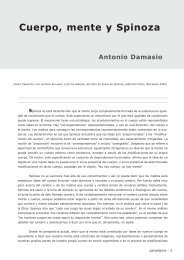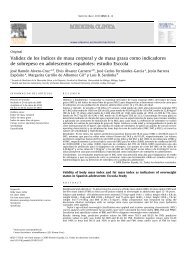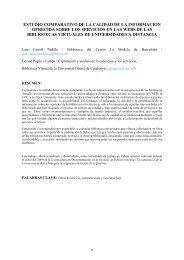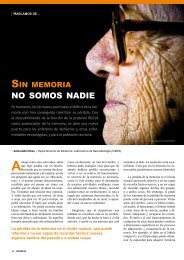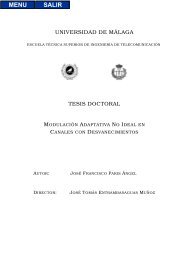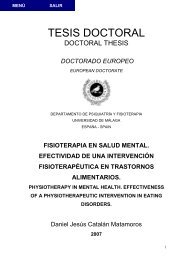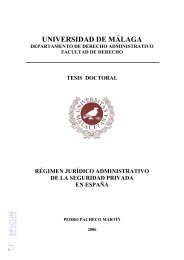Estereotipos negativos hacia la vejez y su relación con variables ...
Estereotipos negativos hacia la vejez y su relación con variables ...
Estereotipos negativos hacia la vejez y su relación con variables ...
Create successful ePaper yourself
Turn your PDF publications into a flip-book with our unique Google optimized e-Paper software.
Referencias<br />
Wal<strong>la</strong>ce, K. A. (1999). A theoretical examination of protective factors in <strong>la</strong>ter life (aging outcomes,<br />
elderly, perceived stress, resiliency, social <strong>su</strong>pport). Dissertation abstracts International:<br />
Section B. The Sciencies and Engineering, 60, (6B), 2993.<br />
Ward, R., Sherman, S. y LaGory, M. (1984). Subjective network assessment and <strong>su</strong>bjective wellbeing.<br />
Journal of Gerontology, 39(1), 93-101.<br />
Ward, R. A. (1977). The impact of <strong>su</strong>bjective age and stigma on older Persons. Journal of<br />
Gerontology, 32(2), 227-232.<br />
Warr, P. y Jackson, P. R. (1983). Self-esteem and unemployement among young workers. Le travail<br />
Humain, 46, 355-366.<br />
Weinger, G., Davies, R. y Shahtahmasebi, S. (1995). Morale in old age: Refining the model.<br />
International Journal of Geriatric Psychiatry, 10(11), 933-943.<br />
Weinberger, A. (1979). Stereotyping of the elderly: Elementary school children´s responses. Research<br />
on Aging. 1, 113-136.<br />
Wetly, T. (1987). Age is a risk factor for inadecuate treatment, Jama, 258, 516.<br />
Wheeler, S. C. y Petty, R. E. (2001) The effects of stereotype on behavior: a rewiew of possible<br />
mechanisms. Psychological Bulletin, 127(6), 797-826.<br />
Whitbourne, S. K. y Hulicka, I. M. (1990). Ageism in undergraduate psychology texts. American<br />
Psychologist, 45, 1127-1136.<br />
Whitbourne, S. K., Culgin, S. y Cassidy, E. (1995). Evaluation of infantilizating intonation and<br />
<strong>con</strong>tent of speech directed at the age. International Journal of Aging and Human<br />
Development, 41(2), 109-116.<br />
Whitbourne, S. K. (1996). The aging individual: Physical and Psychological perspectives. New York:<br />
Wiley.<br />
Whitbourne, S. y Collins, K. (1998). Identity processes and perceptions of physical functioning in<br />
adults. AU: theoretical and clinical implications. Psychotherapy: Theory, Research, Practice,<br />
Training, 35(4), 519-530.<br />
Whitbourne, S. y Sneed, J. (2002). The paradox of well-being, identity processes, and stereotype<br />
threat: Ageism and its potential re<strong>la</strong>tionships to the self in <strong>la</strong>ter life. En T. Nelson (Ed),<br />
Ageism: Stereotyping and prejudice against older persons. (pp. 247-273). Cambridge: Ma.<br />
US. The MIT Press.<br />
White, A. y Groves, M. (1997). Interdependence and the aged stereotype. Australian Journal on<br />
ageing, 16(2), 83-89.<br />
Wilcox, S. J. (1997). Sex and age differences in body attitudes across the adult life-span. (1997).<br />
Dissertation Abstracts International: Section B. The Sciences and Engineering, 57(9-B). 5937.<br />
Wilcox, S. J. (1997). Age and gender in re<strong>la</strong>tion to body attitudes: Is there a double standard of aging?<br />
Psychology of Women Quartely, 21, 549-565.<br />
258




